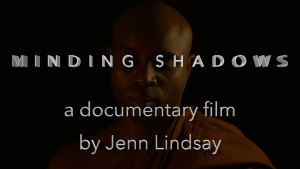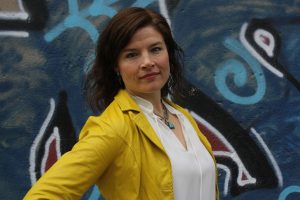 We have recently welcomed Ali O’Hare to the CMAC family as a member of the administrative team. Ali is our new Projects & Development Manager. Research Manager John Balch sat down with her for a Q&A.
We have recently welcomed Ali O’Hare to the CMAC family as a member of the administrative team. Ali is our new Projects & Development Manager. Research Manager John Balch sat down with her for a Q&A.
John: Tell us about your background.
Ali: I did my undergraduate at Boston University. I studied psychology there; I did a focus on brain studies in my major and loved it; I was really fascinated with the mind and how people respond to things. When I graduated I worked at Joslin Diabetes Center at the education department there. That institution is where I really got into research, because they do half-clinic and half in-house research initiatives. They have a really awesome patient population there – so engaged and they all really want to learn and they really help to drive forward standards of care. That was a really cool eco-system to be in. That got me really interested in research more specifically. From there I went to the Baim Institute where they do clinical research. That was where I felt like I learned a lot about how research works, what really goes into a trial, how do you take this idea and then turn it into a reality where you have results. That was really cool, and where I learned those skills.
I came across CMAC on a whim; I was on the internet and this just seemed like a perfect blend of skills that I had spent the last few years working on in research. In terms of my personal interest, I am so fascinated by this work. I think there is lots of crossover with psychology , even with things that are not necessarily based in that. And it’s cool to find work that you get really excited about.
J: So you’ve been working for research organizations that are not strictly tied to universities – what do you see as the role of these types of organizations in the larger spectrum of research in the United States?
A: I think it’s really important. One thing that I saw working in more clinical research is that every once in a while we had one project that was federally funded, and everything else is funded by a pharmaceutical company. Now there’s not anything inherently wrong with that, but I think that it can limit the kind of information that you’re going to get. Because at the end of the day those are major companies that are focused on profit, so they might take their five million dollars and invest it into a trial that’s almost identical to another product on the market. I think there’s a lot of resourcing in that world where I would’ve liked to see that money go to things that are “less profitable,” but could actually bring new knowledge to the field. In my mind CMAC fits in that spot, and organizations like it too. I think it’s important to research things that are interesting that may not necessarily be profitable for a company. I think that knowledge is so crucial, and I would love to see research move more into that realm. Even with federal funding it’s so competitive, so I think it’s so important to democratize research
J: Well and understandably corporations aren’t under any obligation to publish whatever they find out, but there’s a different ethos in what we’re trying to achieve.
A: I find it really interesting and it’s so competitive to get federal grants. The majority of everything is funded by these massive private institutions. I think that research has become really privatized in a way that I’m not sure how much of it is for the greater good. So that was my internal ethos there, so it feels exciting to be somewhere where the first and foremost priority isn’t financial; instead the birth of the thoughts here are: what are the biggest and most important problems of our time and how can we try to help turn the wheel in that direction?
J: So what do you see as some of the biggest challenges and opportunities of CMAC in the next year?
A: I’m excited. I’m excited by the timing of joining now, with the recent press, because it’s so important to get that attention out there. I would love to take that momentum and help build it, expanding both the scope and the size in our resourcing and see what we’re able to do. I’m excited to come on in this time and influence that in really positive ways. I’m excited to look into what creative funding sources we haven’t tapped yet, and see what else it out there. What other cool connections and partnerships are out there?
J: What are some topics you’re interested in expanding on?
A: I’m very fascinated by everything that’s ongoing now. I think that as someone that has deep love for psychology and sociology, anything that puts that lens on something I find really important. But I think that for the issues we already have on the docket we could introduce a new angle, but that they already serve as a great summary for the important questions being asked today.
J: Right, and being at an interdisciplinary center allows you to pursue different topics and approaches in sociology than you might see in a conventional setting.
A: I would love to know about how modeling is moving into sociology. For example, the Atlantic article (see here) focused more on religious studies and the philosophy of the approach. But could you do more massive-scale modeling in sociology, and add greater legitimacy to that science?
I’m also just really, really excited to start meeting and collaborating with the broader network of CMAC, there’s so many people with really cool ideas and fascinating things they’re looking into, so I’m very excited to learn from everyone here.
J: What do you think is the particular value of interdisciplinary research?
A: I think it’s important in terms of finding the best solutions. And also in terms of using our resources wisely and avoiding redundancy. I think one thing that I’ve always been fascinated about from my exposure to academia is that it does sometimes seem that you can have people who do work in different fields and different silos working on the same thing. Or when data gets lost, no one benefits from that. There’s such a positive benefit for science and all of the arts, academia in general and society if we all share our strengths. There’s always going to be someone who knows more about something, and I think that’s where you get the best solutions.
J: So tell us a bit more about you as a person! Been reading any good books lately?
A: I really like Michael Pollan. He just came out with a new book I’m reading right now called How to Change Your Mind. This is a shift from his normal food journalism. This book is all about psychedelics and their history but it’s really cool because he is writing it from a very rigorous point of view, and he’s doing the research and talking to the experts. It’s fascinating to find out things like that BU did a psilocybin experiment in the ‘60s in Marsh Chapel, and I went there and didn’t even know that happened! I think that’s an example of knowledge getting lost, where there was all this research on these substances and then the laws changed, and that knowledge got lost. Now he’s talking about this renaissance that is happening, but they have to go back and try to re-validate the previous work first.
I’m also currently learning ASL right now. My great grandparents were deaf, so it’s always been on my to-do list to learn that language. I really like dogs, I love animals. I think that’s what I got right now, I’m sure something will occur to me later!



